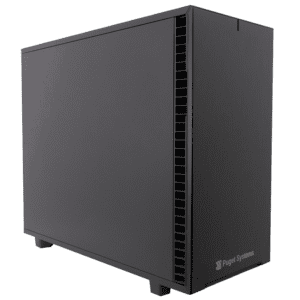As a custom computer manufacturer, we’ve sold liquid-cooled systems from well before I joined the company. A water-based coolant is able to transfer heat away from hot components like the processor (CPU) and video card (GPU) more quickly than air alone would. That added cooling is appealing for folks who want to push their systems beyond design specifications. Overclocking ability is perhaps the most the most tangible benefit of liquid-cooling, but there are other reasons some folks are interested in it: liquid-cooling can make a computer look very stylish, for example, or allow operation of more hot-running components than a chassis could normally keep cool.
Windows 7 64-bit: Running 32-bit Applications
Windows 7 has taken root in the PC community over the last year, a great improvement from the little-liked Windows Vista, and we’ve made the 64-bit version the de facto standard on the computers we sell – to the point where we no longer even list the 32-bit version on our website. We can special-order it still, though, and I find that I am often asked by customers if they would be better off with that because they need to run older programs. This makes me think there may be some misunderstandings about 64-bit Windows out there, so let me set the record straight.
Home Theater PC – William’s Approach
This is the first in a series of blog posts about Home Theater Computers (aka HTPCs). It’s really neat to see how people approach their home theater experience differently, so several of us were asked to write about our setup, what we chose, and why we chose it.
Adobe Premiere Pro CS5 – Mercury Playback Engine
Traditionally, over at least the past 15 years, the main role of a video card in a computer has been to accelerate 3D graphics. That is a large part of what has made modern computer games possible, and it has also contributed heavily to CAD / CAM work and digital animation. Video cards have also helped with 2D graphics and video playback, but the main focus has been on 3D speed.
Core i3/i5/i7 Processors: Intel’s New CPU Line
When Intel first debuted the Core i7 processor line, code-named Nehalem, in late 2008 it made perfect sense. This line of quad-cores brought several new technologies: Turbo Mode, integrated memory controllers, triple-channel RAM, and Hyperthreading (making a comeback from the Pentium 4 era). There were three processors at launch, a 920, 940 and 965 – each slightly faster than the one before it, with the ‘5’ at the end of the last denoting that it was an Extreme Edition chip with some unlocked settings to help with overclocking. Over time the 940 was replaced with a 950, and then 960; the 965 also got an upgrade in the form of a 975. The naming scheme now isn’t so simple — let’s take a look.
TV Tuner Update – 2010
It has been almost two years since I last wrote on the subject of TV tuners in computers, and a lot has changed since then. Over-the-air TV signals have finally gone all-digital, and many cable providers have reduced or dropped their analog cable lineups as well. These transitions, coupled with the release of Windows 7, mean that this year should be an exciting one for those of us with home-theater PCs.
OS Trends Over Time: XP vs. Vista, 32-bit vs. 64-bit
This weekend, Puget Systems updated many of our preconfigured systems to default to Windows Vista 64-bit. This is in direct response to a dramatic increase in popularity of 64-bit over the last few months. As part of my research in making this call, I took a look at our operating system sales over the last few years. I found the data interesting, so I thought I’d share that data, as well as my thoughts!
Are Extreme PCs Going Away?
On Monday, Jason Perlow at Tech Broiler wrote about a $16,000 PC we had built, which has recently been making its way around blog headlines. He commented that “Extreme PCs” are no longer relevant, and asked his readers whether these types of PCs, along with build-your-own homebrew PCs were going extinct. It’s been interesting to read through the reader comments, and I wanted to add some perspective of my own.
Building a $16,000+ PC
We’ve been receiving a lot of media, blog and Twitter attention regarding the “$16,000+ PC” we built late last year. While most of the reviews have been favorable, the comment fields have been their usual mix of reactions and name-calling. LOL! The extra attention has definitely been fun, although I think our web servers would disagree!!!
Overclocked Memory is a Scam
At Puget Systems, we’re seeing more demand these days for extreme high end computers. Triple-SLI, dual CPU, large amounts of memory – people are pushing the limits looking for more performance. We’re building more overclocked computers today than ever before, pushing the CPU and video cards to new and higher limits. One area that has been frustrating to me recently has been memory.
